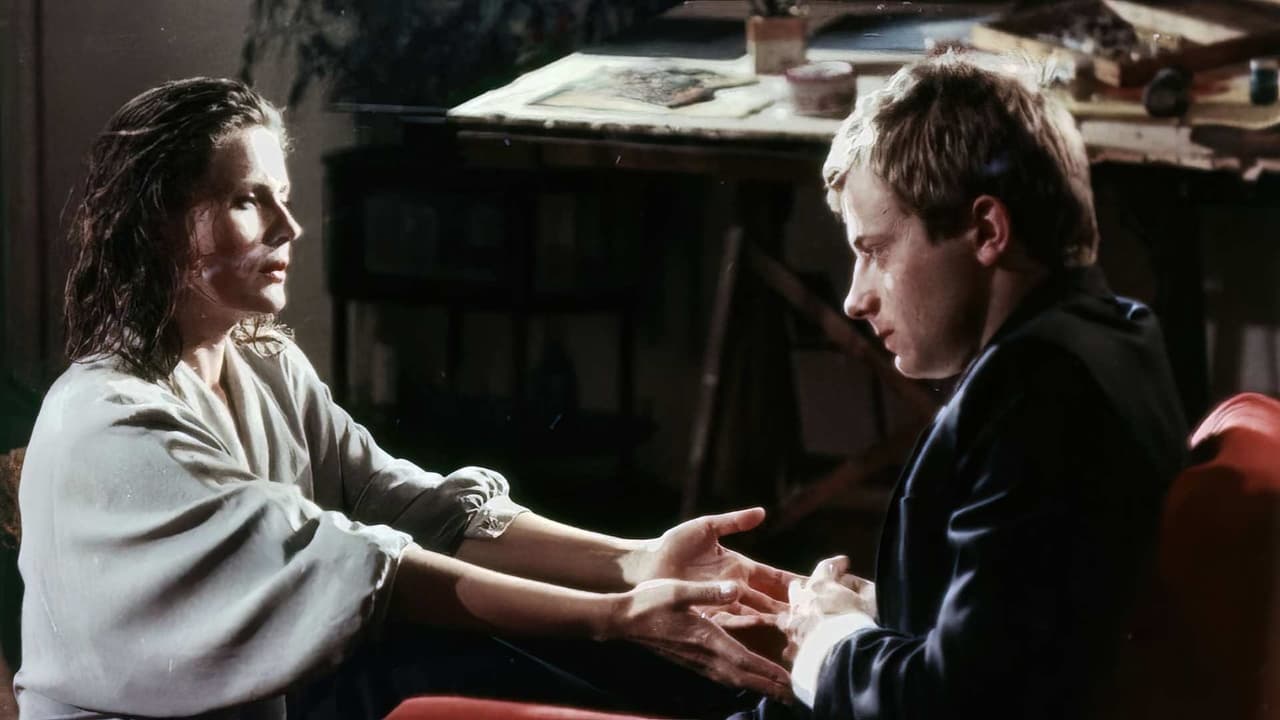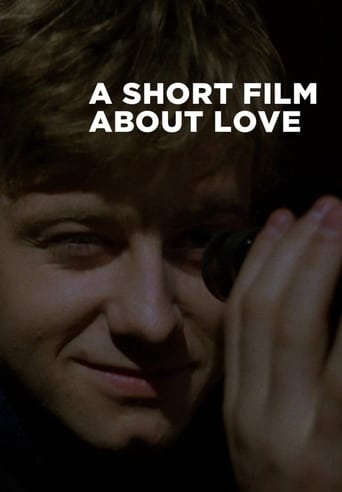



Nice effects though.
Bad Acting and worse Bad Screenplay
Am i the only one who thinks........Average?
The movie really just wants to entertain people.
I saw an Indian version of this movie but it was erotic to me.But after watching this movie,i realized how romantic the story could be.This movie expressed the true love,affection,feelings of the boy tomek brilliantly.Also revealed how much a teenage boy devoted and obsessed to his true love who was much elder than him and not having a good character,he didn't care about it.Also he didn't care about how his daily life and time were affected for his true love.In the end of the movie when magda realized how much he loved her,she felt very depressed and found her true love.Her feelings to the boy was very touchy in the last scenario. Though the ending was not clear to me,as what happen,did tomek die or something else,but the making was very brilliant and extraordinary.Director Krzysztof Kieslowski was very successful to express every romantic expression of this movie.The acting of tomek and magda were excellent,touchy and romantic.
View Morei watched it last night and it completely blew me away. what a brilliant, wonderful, heart touching,.... ( running out of adjectives ) film. while watching it a rarest thing happened to me, tears filled my eyes. last time i remember tears rolling down, it was while watching "to kill a mockingbird". it's actually a good thing that it is one of cinema's best kept secrets because there are people who don't have the heart to appreciate it. i am 19 and a straight guy and i can say for sure there are morons who would call it the crappiest, lousiest film ever. so at least it has been saved from those god forsaken creatures. anyway i just love this movie. my ratings 10/10
View More"A Short Film About Love" is a psychological and unconventional love story that urges the viewer to really feel something from the very beginning until the wonderful ending. It's difficult to be impassive, to not feel anything about the story of a lonely young man who fell in love with a distant neighbor and whom he peeps at with stolen binoculars. The story is told through the lens of the binoculars from where 19-year-old Tomek (Olaf Lubaszenko), a shy Post Office worker who spies his opposite neighbor Magda (Grazyna Szapolowska), a very promiscuous woman. In a Hollywood story many people would have thought that he wants to have sex with her and that he's a perverted. But, his actions are quite different and he'll always try to find a way to be near her and the way he does this approaches are quite odd, disturbing Magda's peace by sending false notices or calling the gas company when she's with another guy at her home. He practically knows everything about her and this obsession gives him a return from the woman who thinks she can play with him just like she does with other guys but things can and will follow through some desperate and sad ways. Writer and Director Krzysztof Kieslowski (who wrote the screenplay along with his collaborator Krzysztof Piesiewicz) tells us a story about a dry and tedious world who tends to suffocate and destroy the notion of love (Magda says to Tomek that she doesn't believe in love), and feelings are thrown to the wind by mere acts, and the best thing someone can do is just sit and watch things happen just like Tomek does being an observer because to be part of them it might not be so interesting in the way you thought it could be. Themes of loneliness, pain, emptiness, the lack of communication are intertwined in a very peculiar and interesting way. But it's not just sad things, there's hope and some funny things too. Perhaps the most positive of the characters is the old lady who lives with Tomek, the grandmother of his only friend, and she likes the boy very much and wants him to be settled with someone, she's the one who really cares about him. She's the most communicative figure in the film and every time she says good things to him about how a girl likes to be treated and other things. In a world where it's more easy to shout and complain about everything than to say "I Love You!" Tomek finds his way; he's a bold character with a awkward way to express what he considers to be love. I really prefer his ideal of what love is than to the concept presented in "Atonement" for instance (great film though). It is a realistic story but at the same time it's not. If the director presents a real world with real situations in one hand, on the other he gave us a romantic and cinematic notion of some very fantastic and beautiful things (in real life many people would've call the police if they met a obsessive stalker. Instead of that we see a curious woman who wants to know more about this guy). This contradiction works and life itself has many of them. Kieslowski once again made a wonderful movie, very calm, his camera allows you to see all the details, tiny little things that makes a tremendous effect on the story and in the viewer. The slow pace is precisely great to show Tomek's perspective looking inside of Magda's apartment, all this presented brilliantly. Kieslowski could tell the whole movie just by showing those images that I would love the film anyway. His direction of actors are very efficient too. To me, Olaf Lubaszenko will always be remembered by his portrayal of Tomek, wonderful job, he really felt the character, made him very believable and it's very difficult to resist to his charming puppy eyes. Grazyna Szapolowska is spectacular as well, she dominates the second half of the film in a astonishing way when her character realizes what Tomek really felt about her.Art in its best form, "A Short Film About Love" is highly recommended to everyone who enjoys great cinema and philosophical stories. This movie really is gonna make you to have a opinion about it, it will prevail in your memory. 10/10
View MoreA Polish art-house director Krzysztof Kieslowski is most well known for his international films, La double vie de Véronique (1991) and the Three Colours trilogy: White, Blue and Red. Kieslowski graduated from Łódz's film school in Poland, from which many directors have started their journey, for instance Andrzej Wajda and Krzysztof Zanussi. Krzysztof started by directing documentaries, as many do. From documentaries he moved to television films and then to fiction features. Kieslowski is very well known from his TV-series "Dekalog" (1989), which still is seen as one of the highest achievement of European television. Dekalog is a ten episode long series about The Ten Commandments, each episode deals with one commandment. Some might find it odd that an atheist made a TV-series about The Ten Commandments, but Kieslowski doesn't approach the subject religiously as he does ethically. Because the Bible and The Ten Commandments have had a huge impact on our conception of what is right and what is wrong. As an entirety the series builds a picture of a modern man facing moral problems.This brief introduction leads us to Kieslowski's film A Short Film About Love (Krótki film o milosci). From two episodes of Dekalog Kieslowski decided to make full length films, episode five: Thou shalt not kill (A Short Film About Killing) and episode six: Thou shalt not commit adultery (A Short Film About Love). Both, the episode and the film, are very interesting. And the perspectives the viewer takes change. When watching the episode one tries to find a bond with the commandment - Thou shalt not commit adultery. But when watching the film one might simply look it as a survey of love in the world we live in.As in all episodes of Dekalog, so does A Short Film About Love take place in Polish suburb near Warsaw. Kieslowski tries to build his own world view in this soulless place full of loneliness and selfishness. Kieslowski says in his interview book, Kieslowski on Kieslowski that the most interesting thing in this film is perspective; the film is divided into three parts. First we see a boy, 19-year-old Tomek who is stalking a woman. We don't know anything about this woman, we only see what Tomek sees. He is disturbing the woman, trying to see her and ruin her relationships. Suddenly we see them together for a little while, the woman upsets Tomek and Tomek cuts his wrists. Now the third part starts, we see everything from the perspective of the woman. She starts to feel pity, yearning, compassion and love towards Tomek. But the camera never goes to the hospital with Tomek, we only see what the woman sees. And in the end the woman looks into the telescope - into herself.When watching A Short Film About Love as a film about the commandment Thou shalt not commit adultery, I interpreted it like this. In the film we see a lot of glass, windows, the glass could be the motive of the film. In the beginning Tomek breaks the window to get inside the warehouse. He also stalks the woman behind his window, and sees her behind her window. Also there is a glass shaped like a circle next to the woman's window. To me the glass, the window symbolizes the illusion. Magda (the woman) breaks Tomek's illusion of love, by showing that there is no love, that there is only sex. Then Tomek breaks Magda's idea of love, he breaks her hard shell. When I watched the episode I thought this was the "Adultery" they committed. They broke the illusion. Thou shalt not commit adultery.But before I had seen Dekalog, I had seen the film, so then I didn't think about the commandment, all I thought was the major subject the relation between love and loneliness. One sees love as a pure, beautiful thing, but isn't sure how to show it and the other sees love simply as sex, she doesn't think that love even exists. The viewer obviously sees that Tomek isn't alright, he is sick. He is in love. In our selfish, cold and cynical world love can't be anything else except a sickness. A small detail about this is when the godmother is watching Poland's beauty queen contest - is this love in our society?Krzysztof Kieslowski's series Dekalog and all his later films are born from the hands of this amazing trio: Kieslowski himself as a writer/director, Krzysztof Piesiewicz as the screenwriter and Zbigniew Preisner as the film score composer. I think Preisner was very important to Kieslowski. His music added a new level of beauty to his films, all of us who have seen The Double Life of Veronique, know what I mean. Preisner's music is honest, true and beautiful just as Kieslowski's films. Another important man in Kieslowski's production was the cinematographer, Sławomir Idziak who worked with him in Veronique, Blue and Dekalog: episode 5 (Thou shalt not kill). So Kieslowski's film A Short Film About Love isn't just a new version of Hitchcock's Rear Window, it is a picture of a lonely man, it's a moral study about our conception of love and also a very beautiful story.
View More